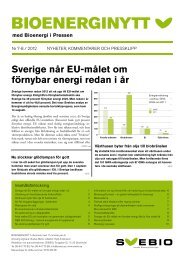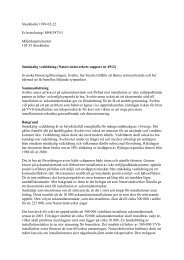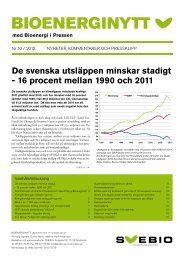Proceedings World Bioenergy 2010
Proceedings World Bioenergy 2010
Proceedings World Bioenergy 2010
Create successful ePaper yourself
Turn your PDF publications into a flip-book with our unique Google optimized e-Paper software.
INSTRUCTIONS FOR PREPARATION OF PAPERS<br />
THE ECONOMIC, POLITICAL AND SOCIAL ISSUES, HINDERING THE ADOPTION OF BIOENERGY IN<br />
PAKISTAN: A CASE STUDY<br />
Umair Usman<br />
UCH<br />
Moonoo Chowk, Raiwind/Defence Road E. Lahore, Pakistan<br />
Umair@uch.com.pk, Tel: 92-42-5321636, Fax: 92-42-5321638<br />
ABSTRACT: The paper will inform the audience about the energy crisis that has crippled Pakistan’s economic growth<br />
since the last 4 years, and the role that <strong>Bioenergy</strong> can play in resolving the issue. In order to help ease Pakistan in its<br />
effort to curb this crisis and to get useful insights into the role that <strong>Bioenergy</strong> can play in solving Pakistan’s problems,<br />
business ventures were attempted. The results were not encouraging and shed light onto the financial and technical<br />
hindrances involved in creating and running bioenergy businesses in Pakistan. These issues themselves linked to the more<br />
general Social, Economic and Political barriers for the adoption of <strong>Bioenergy</strong>. The paper concludes by providing<br />
suggestions and recommendations, as to what the government, private sector as well as the international community can<br />
do in order to overcome the crisis.<br />
Keywords: Bio energy Policy, Biogas, Bio-ethanol, Third <strong>World</strong>, Pakistan<br />
1 INTRODUCTION<br />
Energy is considered to be the life line of any<br />
economy. It is significant determinant of socioeconomic<br />
development and is therefore one of the most important<br />
strategic commodities [26]. Traditional growth theories<br />
focus on the labour, capital and technology as major<br />
factors of production and ignore the importance of energy<br />
in the economic growth process [16].<br />
In the era of globalization, even though dependence<br />
of economies on energy and its demand is rapidly<br />
increasing, the supply of it remains uncertain. Therefore<br />
energy shortage will be one of the biggest problems<br />
facing mankind in the next century [16].<br />
One such country which is already facing an energy<br />
crisis is Pakistan. Energy plays an important role as<br />
compared to other variables included in the production<br />
and consumption function for Pakistan, as it is in an early<br />
stage of development [10]. Already Pakistan’s economy<br />
has been under constant stress due to is energy crisis [7],<br />
leading to a sharp decrease in its economic growth rate.<br />
In order to study the role that <strong>Bioenergy</strong> can play in<br />
overcoming the energy crisis, two business ventures were<br />
attempted i.e. selling Biogas plants and Bio-ethanol.<br />
Biomass seemed like a logical alternative energy solution<br />
due to the country’s large agricultural base. However<br />
both businesses failed at different stages of development<br />
due to several micro and macro factors. Reflecting on<br />
these failures, new business models are discussed that can<br />
help create a formal Biomass industry.<br />
However before details of the ventures are looked<br />
into, it is imperative that Pakistan’s energy profile is<br />
studied first, in order to better understand its needs.<br />
.<br />
2 PAKISTAN’S ENERGY PROFILE<br />
2.1 Country profile<br />
Pakistan is a middle income economy, with an<br />
estimated population of around 170 million, among the<br />
highest in the world. It is the founding member of<br />
SAARC, G-8 and the OIC. Not only is it a major military<br />
and nuclear power, but South Asia’s second largest<br />
economy and a front line state on the war in terror.<br />
It has sustained excellent growth record in the past<br />
decade thanks to liberalization, and an opening up of the<br />
economy. Due to economic growth that took place in in<br />
the first half of the 2000s, the GDP of Pakistan doubled<br />
between 1999 and 2007. The growth in GDP was even<br />
higher than the population growth and therefore GDP per<br />
capita increased by almost sixty percent between 2000<br />
and 2008. Recognizing Pakistan’s economic growth,<br />
Goldman Sachs now considers Pakistan to be among the<br />
‘Next Eleven Countries’ i.e. nations that are likely to<br />
become sizable economic powers and have greater<br />
impact on global business in the new century [34]. As<br />
Pakistan’s agriculture, industry, trade and services sectors<br />
have been growing rapidly, the government has remained<br />
negligent to the surge in energy demand, leading to a<br />
massive shortfall in energy, which is only expected to<br />
widen [26].<br />
One of the key strategic objectives of the Musharraf<br />
era was to turn Pakistan into an energy corridor,<br />
connecting Central Asia (China and the oil producing<br />
countries) to the rest of the world (14; 13; 26). However<br />
Pakistan itself is now facing a major energy crisis. To<br />
look into this crisis in detail, it is imperative to look at<br />
Pakistan’s energy profile in order to better understand the<br />
supply and demand of different sources.<br />
2.2 Energy Profile:<br />
world bioenergy <strong>2010</strong><br />
69









